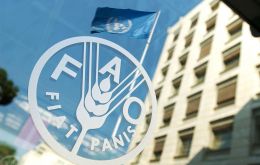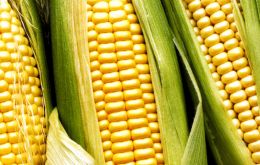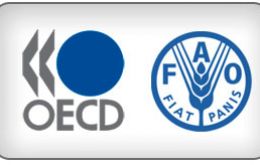MercoPress. South Atlantic News Agency
Tag: Food and Agriculture Organization (FAO)
-
Monday, December 11th 2017 - 01:48 UTC
Fishing subsidies to be on the WTO summit table in Buenos Aires

Meeting for the first time in Latin America, the World Trade Organization’s 11th Ministerial Conference will take place in Buenos Aires from 10-13 December. Central to this year’s talks will be an international deal to curb harmful fishing subsidies. These are government payments or tax breaks that contribute to overcapacity, overfishing and illegal fishing (IUU) globally.
-
Friday, November 10th 2017 - 17:35 UTC
WHO, FAO and OIE call for responsible use of antibiotics in humans and animals

In the lead-up to World Antibiotic Awareness Week (13-19 November 2017), the Food and Agriculture Organization of the United Nations (FAO), the World Health Organization (WHO) and the World Organisation for Animal Health (OIE) are together calling for responsible use of antibiotics in humans and animals to reduce the emergence of antibiotic resistance.
-
Tuesday, September 12th 2017 - 09:32 UTC
FAO forecasts an all time record global cereal production

Global food prices dipped in August, mainly as the prospect of bumper cereal harvests pushed up expectations for larger grain inventories. The FAO Food Price Index declined 1.3% from July, averaging 176.6 points in August.
-
Thursday, July 13th 2017 - 18:30 UTC
Global food commodity prices rose in June, led by wheat and meat prices.

The FAO monthly Food Price Index averaged 175.2 points in June, up 1.4% from May and 7.0% from a year earlier. The FAO Cereal Price Index rose by 4.2% in the month, amid surging prices of high-protein wheat due to deteriorating crop conditions in the United States of America. Maize prices, by contrast, declined amid record harvests in South America.
-
Tuesday, May 23rd 2017 - 14:55 UTC
Global food prices down with expectations of robust supplies in key staples

Global food commodity prices fell in April amid expectations of ongoing robust supplies of many key staples. The FAO Food Prices Index averaged 168 points in April, down 1.8% from March although remaining 10% higher than a year earlier.
-
Friday, April 7th 2017 - 12:36 UTC
Global prices fell in March amid large supplies and expected strong harvests

Global food prices monitored by FAO fell in March amid large available supplies and expectations of strong harvests. The FAO Food Price Index averaged nearly 171 points in March, marking a 2.8 percent drop from the previous month while remaining 13.4 percent above its level a year earlier.
-
Tuesday, October 4th 2016 - 19:19 UTC
Cephalopods congress and frozen seafood exhibition opens in Vigo

Spain's Fisheries Secretary General Andrés Hermida opened on Monday the World Congress on Cephalopods organized by FAO and the Conxemar in Vigo underlining the importance of this large and heterogeneous group of species, --octopus, cuttlefish, squid--, for the fisheries sector and as raw material for the processing industry.
-
Wednesday, August 17th 2016 - 19:54 UTC
Devastating livestock viral disease threatens millions of sheep and goats

A devastating livestock disease is continuing to extend its global reach and is now present in 76 countries. Georgia recently reported its first-ever case of Peste des Petits Ruminants (PPR), a viral disease which is capable of severely impacting goat and sheep populations, while a new outbreak has occurred in the Maldives, showing that even island states are vulnerable to the plague.
-
Thursday, August 4th 2016 - 22:59 UTC
FAO Price Index reports modest decline in July as grains and vegetable oils drop

The international prices for major food commodities saw a modest decline in July, following five consecutive months of increases. The FAO Food Pice Index (FPI) averaged 161.9 points in July 2016, slipping 0.8 percent (1.3 points) below its level in June and 1.4 percent below its level of July 2015.
-
Tuesday, July 5th 2016 - 07:21 UTC
OECD-FAO forecasts agriculture prices will remain relatively flat overall in next decade

The recent period of high agricultural commodity prices is most likely over, say the OECD and FAO in their latest 10-year Outlook. But the two organizations warn of the need to be vigilant as the probability of a major price swing remains high.
